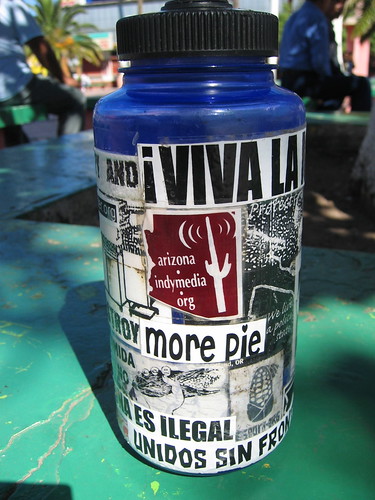Abril 10, 2008
The Dilemmas of the Ethical Media Activist Journalist
Last weekend at Dry River we had the honor of hosting Miguel, a Brazilian Indymedia videographer, and his new film, "Brad, One More Night At the Barricades," which tells the story of Brad Will, his (activist) life, and the "movement of movements" that he was a part of.
The film was really well-made, and really thought-provoking. It was told in a personal style, with the narration of Miguel tying it together with his own personal take on his murdered friend, along with the interviews with other friends of Brad, and it did a great job of depicting that feeling, which I have felt, of wondering, in a dangerous situation, when you should stop filming and take action to protect your own self. True, there was a lot of "riot porn," but overall it was a very thoughtful and powerful addition to the library of Indymedia films that try to tell the story of this struggle we're all in... Furthermore, it had the effect of softening some of my objections to the whole Oaxaca/Brad martyr/hero phenomenon.
I was going to call this post "Rich White People With Cameras Protecting Poor Brown People From Even Richer White People With Guns." But I thought that seeing that headline before reading some of the context of my thoughts would be a little too inflammatory.

It's complicated, but basically, Brad Will was one of a type of indie-journalists, a group that I'm a sometime member of too: privileged, globe-travelling white media activists, touching down in "oppression hot spots," nominally to try to document injustice and the fight against it, and get that documentation out to people who need to see it. I do that, I've done that, along with hundreds of others. And with each person, each member of this privileged group, their story is different, and the extent to which they pursue that mission with integrity is different, and varies over time, too.
Brad was no hero, and neither am I. Did I fly to Guatemala 3 years ago to go to school and improve my spanish so that I could interview the mothers of murdered girls in Juarez without an interpreter? Yes. Did I also go to Guatemala to escape winter and the boredom of everyday existence? Yes. Are there many young rich white kids with camcorders that travel to activist mobilizations with sometimes more ulterior motives than virtuous objectives? Yes.
There were similar, shall we say, complications in Brad's life, even personal imperfections I've heard about that I will discretely refrain from detailing here. However, overall, after seeing Miguel's film, I feel like Brad had a level of dedication and integrity that puts him at least at some level above the average in this group I'm talking about. He truly put his body on the line many times over the years in many places, from the Lower East Side to the Pacific Northwest to Northeast Brazil, before that day in Oaxaca where he filmed his own death. I believe now that his heart was in the right place, and though he made some mistakes, he made them for the right reasons. (Still, though the desire to not make a hero of Brad was mentioned in the film, its biggest shortcoming, I feel, is not following up on this desire quite enough.)
Greta and I talked about this with our friend Kai, a freelance photographer from Germany who has spent years in hotspots like Palestine, Iraq, and Kosovo. Do you ever think, as I do, I asked him, that it might be more effective to send or bring cameras to the oppressed peoples whose struggles you document, something like the Chiapas Media Project, and enable them to tell their own stories, instead of making trip after trip to these far-off places to tell their stories for them?
No, he said with confidence. Because white internationals won't be killed, at least not as often, and by their very presence they protect the people they're with. In fact, he said, "When in a place like that I always go with at least one other white person, so that if they kill me, at least he will witness it. 500 Palestinians claiming that I was murdered doesn't count, but one fellow white journalist does."
So what we came up with is this: Yes, we're privileged. But the mission before us is to use that privilege with integrity and purpose, as tools - tools that are a shield and a magnifying glass to protect from and reveal injustice. There are, for each of us, flaws and contradictions and failings in the day to day living of this mission, and there are people, frankly, that try harder than others. I now think Brad was probably one of those that tried at least somewhat harder than most.
Still, he shouldn't be made into a martyr, or an icon. I still flinch whenever I see his photo on the banners of indymedia sites. Honoring his memory is one thing, but making him into some sort of permanent patron saint of the Independent Media Center, turned into a logo next to a red star, is not appropriate. We do Brad an injustice by iconifying him, turning him into a symbol, just as my previous disapproval with him was really a disapproval of a stereotype that he came to symbolize for me, before Miguel's film taught me enough about him to de-symbolize him, make him real - a real person, with real dreams, commitments, desires and shortcomings, and real beliefs that he voiced in real words that had real pauses and "umms" and "uhs" in between them.
Thanks Miguel. Great job.
Posted by steev at Abril 10, 2008 10:20 AM